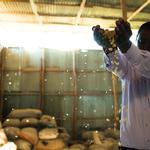Journal Article
| 2013
Does an educated mind take the broader view? A field experiment on in−group favouritism among microcredit clients
A number of studies document an in-group bias in social dilemma situations. While group structure and dynamics are important in shaping in-group favouritism, less attention has been paid to individual characteristics affecting favouritism. Using data from dictator games conducted among 523 microcredit clients in Angola, this paper analyzes the effect of education on in-group favouritism. When addressing the endogeneity of education, we find that education increases in-group bias. This goes against the conventional view that education broadens the perspectives of an individual. In addition, our results suggest that in-group favouritism is related to gender, family background and access to particular forms of networks.
Read more:
https://doi.org/10.1016/j.socec.2013.02.021
https://doi.org/10.1016/j.socec.2013.02.021

Poverty and entrepreneurship
Jan 2011 - Dec 2014

On the mechanics of microfinance
Jan 2011 - Dec 2014

Micro credit for Sustainable Development in Angola
Jan 2008 - Dec 2010






